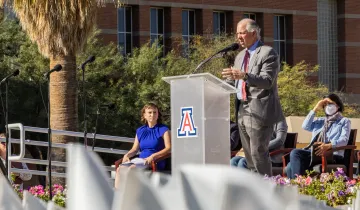A Letter from President Robert C. Robbins
Dear Wildcats,
This past May, I conferred over 11,000 degrees on your newest fellow alumni during the University of Arizona’s first-ever virtual Commencement. While this was not the celebration any of us anticipated, an incredible team worked around the clock to give our graduating students a proper send-off, and I am very proud of the celebration we had. You can watch it yourself at commencement.arizona.edu. I think you will especially appreciate the inspiring words of our speaker, Alison Levine ’87, who knows a lot about overcoming incredible odds.

As a university, our focus is now on working with local and national experts to create best-in-class strategies in hopes of reopening this fall. We are fortunate to have Dr. Richard Carmona, one of the United States’ best-qualified experts, leading this effort. Carmona served as the 17th Surgeon General of the United States from 2002 to 2006, managing large-scale medical emergencies, and his expertise spans medicine, public health, emergency preparedness and crisis response. He has been a faculty member at the university for 35 years, and his experience operating an incident command system will facilitate the university’s return to in-person operations.
The recent protests following the murder of George Floyd in Minnesota put the work of the Campus Reentry Plan Taskforce in a new context. During one of our weekly briefings, our students spoke eloquently about the need to prioritize equity and inclusion as we plan any reentry to campus, particularly as the COVID-19 pandemic has disproportionately affected Black and other marginalized people and communities in this country, in addition to those with chronic diseases or who are immunocompromised. We cannot be successful in a return to campus without meeting the needs of these members of our community, whether they are able to attend classes or work in person or they determine it is safer for them to continue remotely.
The heart of our strategy is our intention to Test, Trace and Treat to understand the spread of the virus and the risk for our campus, and you have most likely heard about the university’s plan to make antibody testing available to every student and faculty or staff member. This will allow individuals to determine whether they have developed antibodies to COVID-19.
I was fortunate to be one of the first to take the antibody test, and while I was disappointed to learn I do not possess the antibodies, it was profoundly encouraging to see the process in action. We have had outstanding initial news about the test’s accuracy and sensitivity, and we are working with the state of Arizona to expand the program to 250,000 of Arizona’s first responders and health care professionals.
With the antibody testing for potential immunity, viral load testing for diagnosis of infection, and Dr. Carmona working to aggregate and understand the data, we will have informed plans for reopening, including accommodations for those who cannot immediately return to campus in person. We intend to create a flexible and adaptive teaching and learning environment that meets the needs of every student.
In addition, our goal is for these tools to be widely available to help determine potential care protocols beyond the university’s campus as part of our mission of service. If you are able, I urge you to help support the fund for testing and research so we can achieve this goal.
Even as we have pivoted to focus on responding to the pandemic, university business that began before the crisis is still moving forward. A year ago, I asked the University of Arizona Foundation and the Alumni Association to work together in creating a plan to functionally integrate the alumni and development operations into one unified program. I am pleased to share that as of July 1, the central alumni and development offices have come together as a new, cohesive team dedicated to engaging constituents in ways that help the university achieve its strategic goals.
With this change, we will achieve full integration of strategic planning, programs, budgets and staff teams in the alumni and development offices. This partnership is just one example of the many ways the university will continue to transform and ensure efficiency and resiliency for years to come. It is more important than ever for campus partners to share resources, collaborate and deliver integrated services to you, our Wildcat Family members.
Your relationship with the University of Arizona is incredibly important to us. When you attend sporting or cultural events, volunteer your time to help students or give to support causes that are meaningful to you and your family, you contribute to making the Wildcat community vibrant, inclusive and compassionate. This spirit is why I am proud to be a part of this community.
Stay safe and Bear Down.
